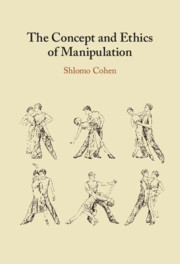
-
Select format
-
- Publisher:
- Cambridge University Press
- Publication date:
- April 2025
- April 2025
- ISBN:
- 9781009443432
- 9781009443449
- Dimensions:
- (229 x 152 mm)
- Weight & Pages:
- 0.52kg, 254 Pages
- Dimensions:
- Weight & Pages:
- Subjects:
- Ethics, Philosophy, Political Philosophy
You may already have access via personal or institutional login- Subjects:
- Ethics, Philosophy, Political Philosophy
Book description
Everyone is exposed to manipulation daily, and everyone manipulates too. The impact of manipulations in personal, social, and political life is enormous. Is this tragic? Is it avoidable? Is it always morally bad or regrettable? To answer these questions, we need a theory of manipulation. This book is the first comprehensive philosophical theory of manipulation. Shlomo Cohen offers a new theory on what manipulation is, distinguishing it from other kinds of influence, and assesses the basic moral status of manipulation. In contrast to prevailing views, he argues that manipulation, though often morally bad, is not inherently morally bad, and that alongside its dangers, it has a central role as a 'lubricant' of social frictions which helps to regulate social and political relations. His analysis offers a window to better understanding the ethics of the interplay of reason and power in human relations.
Reviews
‘While manipulation has received greater attention over the last decade or so from philosophers as well as legal scholars and experts in the decision sciences, book-length treatments remain scarce. Cohen's book lands at the perfect time, and provides a novel philosophical approach to understanding the nature of manipulation as something that evades the traditional philosophical method of conceptual analysis. Cohen provocatively argues that manipulation has up to this point largely received a bad rap, with important implications for the way we live together in political society.'
Moti Gorin - Colorado State University
‘… one wonders, after reading Cohen, how often … decisions are themselves unconscious. Are we manipulated to be manipulators, by ourselves to ourselves? We must respect any book that leads to such questions. Cohen is quite mordant. His book is one for our time, a rough and tumble era without an aspirational character.’
Christopher Giofreda Source: Thoughtfox
Contents
Metrics
Altmetric attention score
Full text views
Full text views help Loading metrics...
Loading metrics...
* Views captured on Cambridge Core between #date#. This data will be updated every 24 hours.
Usage data cannot currently be displayed.
Accessibility standard: Unknown
Why this information is here
This section outlines the accessibility features of this content - including support for screen readers, full keyboard navigation and high-contrast display options. This may not be relevant for you.
Accessibility Information
Accessibility compliance for the PDF of this book is currently unknown and may be updated in the future.

